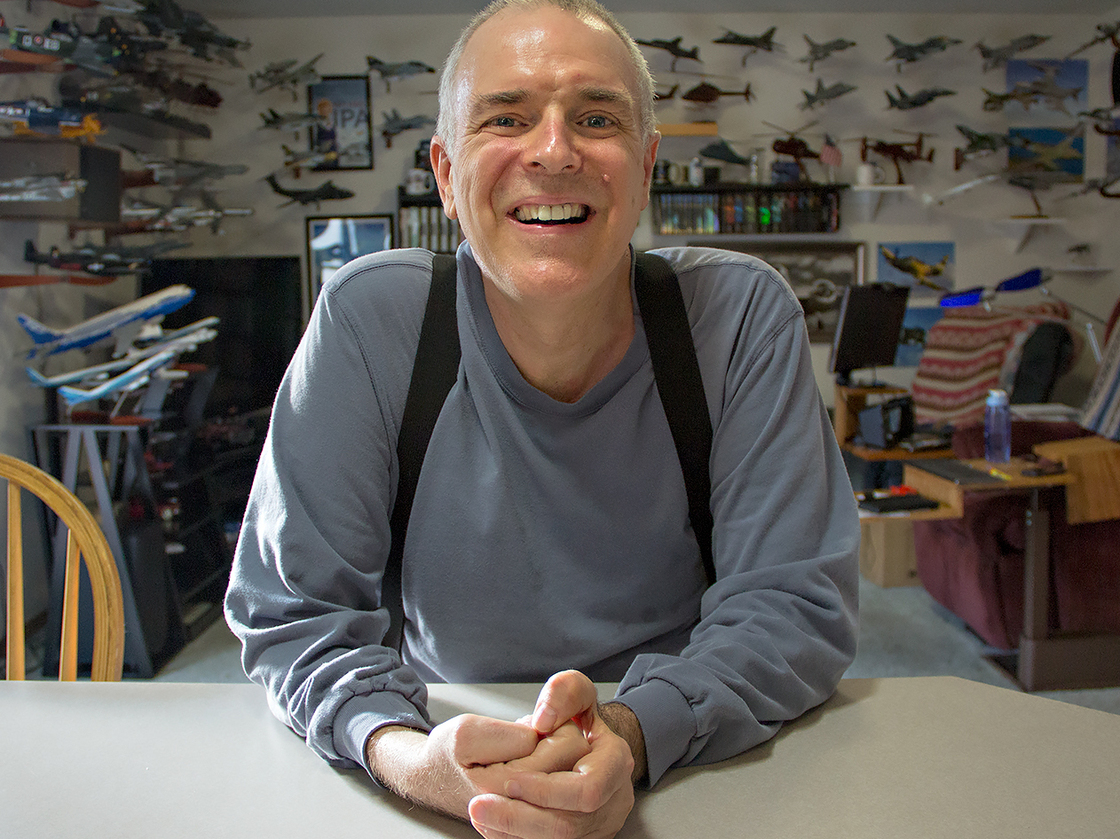fromKPLU
 Carl Moore, a former helicopter mechanic, was diagnosed with ALS 20 years ago. He has had unusual longevity for someone with ALS but expects someday to rely on his wheelchair and speech-generating device.
Carl Moore, a former helicopter mechanic, was diagnosed with ALS 20 years ago. He has had unusual longevity for someone with ALS but expects someday to rely on his wheelchair and speech-generating device.
Carl Moore, a former helicopter mechanic, was diagnosed with ALS 20 years ago. He has had unusual longevity for someone with ALS but expects someday to rely on his wheelchair and speech-generating device.
So Carl Moore of Kent, Wash., worked with a speech pathologist to record his own voice to use later — when he can no longer talk on his own.
Most ALS patients live only a few years after diagnosis, but Moore, a former helicopter mechanic, is the exception — he was diagnosed 20 years ago. At the beginning, he lost use of his hands, and it wasn't until years later that he found that the symptoms were affecting his speech.
Carl Moore shows some of the phrases he's recorded in his own voice and stored on his speech-generating device.

Carl Moore shows some of the phrases he's recorded in his own voice and stored on his speech-generating device.
"You can hear my three-shots-of-tequila speech," he says. "And it does get worse as I get tired."
So several years ago, before that slur crept in, he recorded hundreds of messages and uploaded them to the speech device he'll someday rely on. The machine looks like a chunky tablet computer, and it would normally sound like a robot. But now, instead, it will sound like Moore.
"It's almost like preserving a piece of yourself," he says. "I've taken auditory pictures of who I am."
Moore is kind of a snarky guy — some of his messages can't be played in decent company. It's a part of his personality that he's rescuing from the disease.
And it's not just for his own benefit. Message banking also helps his caregiver: his wife, Merilyn.
"If it's a computer voice, I think it's harsh," she says, "whereas if it's his own voice, I can feel like he's actually speaking those words."
John Costello, a speech pathologist at Boston Children's Hospital, is credited with inventing the clinical use of voice banking. He says it can make a big difference in people's quality of life.
"If you wanted to say something like, 'You're the love of my life,' having that in synthetic speech is devastating," Costello says.
One patient's wife, he says, contacted him shortly after her husband's death. "She wrote to me that the work that we did was the only bright forward movement. Everything was about loss, except the possibility of communication."
Yet for all its benefits, in Kelley's clinic, only a fraction of patients actually do it.
"The ones that don't do it can't deal with it," she says. "They don't want to think about using an electronic piece of equipment to talk. So most of them nod, smile and do nothing."
Heartbreakingly, many come back hoping to record their voices after it's too late.
Carl, on the other hand, brings a mechanic's pragmatism to the project, and he's clearly having some fun too. Besides letting him razz Merilyn for years to come, the recordings will become an archive for her.
So Merilyn wants to make sure Carl has banked the really important things — which raises a question: Where, among the witty barbs and the practical lines, were the messages of tenderness, of intimacy?
"My conversations are mostly sarcastic," he says. "She asked me before we left if I had the phrase 'I love you,' and I realized I didn't."
He says he'll make more recordings at some point — sooner rather than later. The trouble, he says, is his voice has already gone downhill.
"We'll see how it works out. I'm not comfortable with recording my voice as it is," he says.
"I think that it's important that we capture you as you are now," Merilyn says. "We love you as you are now just as much as eight years ago."
"So I will record, 'Yes, dear.' "
Later, Carl dug back through his hard drive and discovered that he had, indeed, recorded himself saying "I love you." He added it to the device that will someday speak for him.



Movers And Packers in Kolkata
ReplyDeletePackers Movers in Kolkata
Im glad that Neuroxium I had the fortune to stumble across your webpage. Its definitely an important issue that not enough people are talking about and Im glad that I got the chance to see all the angles.Personally Im impressed by the quality of this. Generally when I come across these sort of things I like to post them on Digg. Although this time Im not sure if this would be best for the users. I will be sure to submit something else though. http://www.healthcaresdiscussion.com/neuroxium/
ReplyDeleteI am going to go ahead and bookmark this post for my brother for a coming up Action Fuel PRO research project for class. This is a appealing internet site by the way. Where did you acquire the template for this webpage?Good day, simply turned into alert to your blog through Yahoo, and located that its truly educative. I am gonna be careful for brussels. I'll be grateful for those who proceed this in future.
ReplyDeletehttp://www.healthcaresdiscussion.com/action-fuel-pro/
How is it that just anybody can write a blog and get as popular as this? Its not like youve said anything incredibly impressive Prolongz more like youve painted a pretty picture over an issue that you know nothing about! I dont want to sound mean, here. But do you really think that you can get away with adding some pretty pictures and not really say anything?http://www.healthcaresdiscussion.com/prolongz/
ReplyDelete